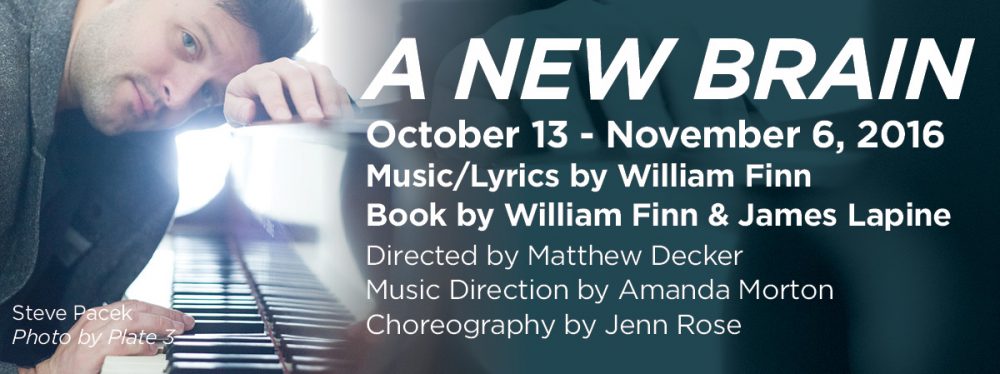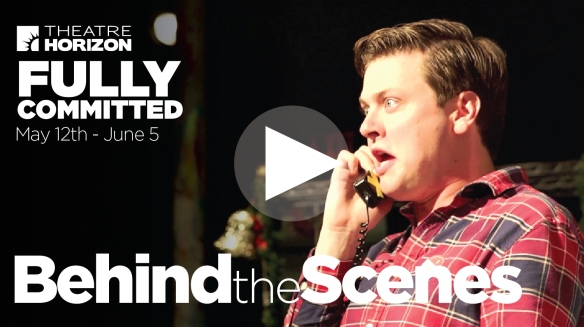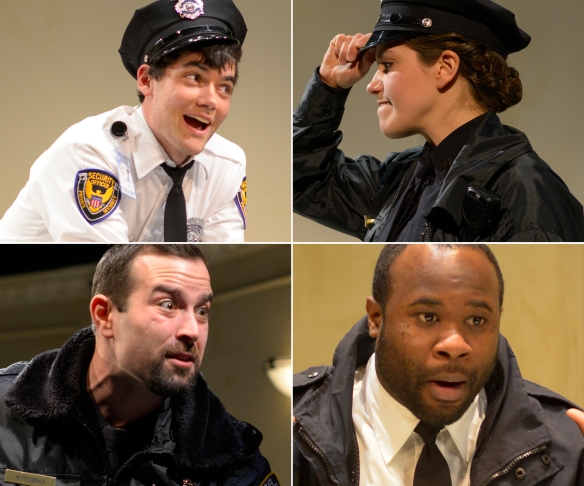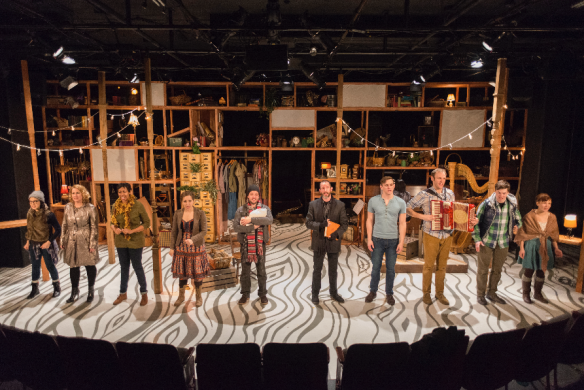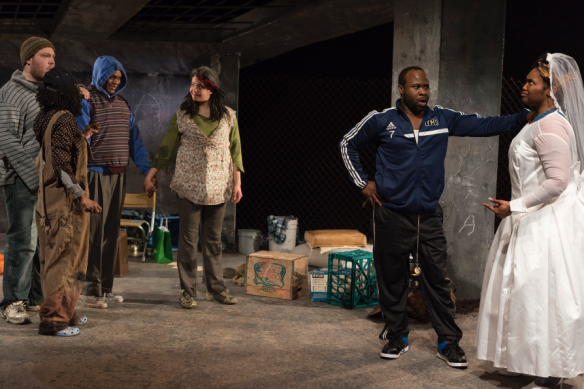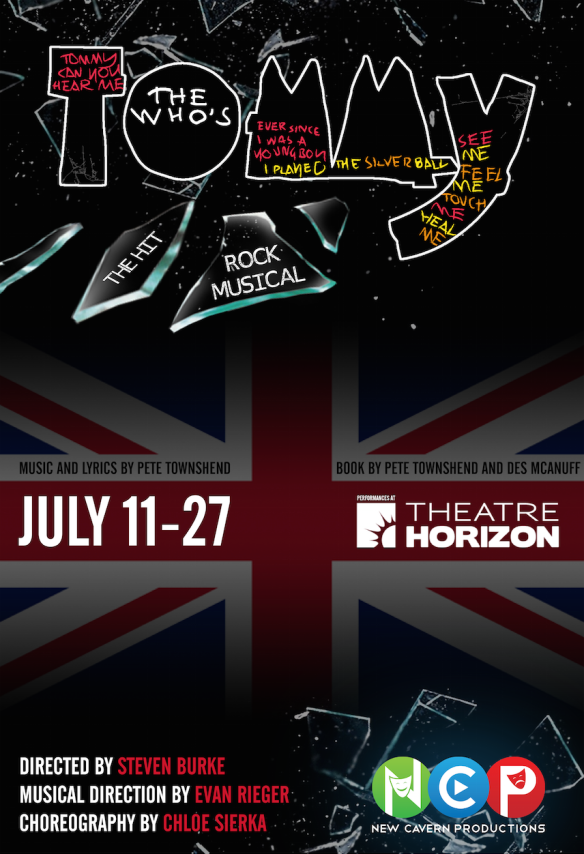Becky Mode’s Fully Committed – now playing at Theatre Horizon in Norristown – is a one-person show with nearly 40 separate roles. It’s a true tour de farce. Our reviewer Wendy Rosenfield said it was a great reason to stay in Philly to see the show rather than travel the New Jersey Turnpike up to New York to see it. Michael Doherty is, by all reports, hilarious in the athletic role of Sam the chef and 36 others. Here is a clip from the show, provided courtesy of Theatre Horizon:
Category Archives: Uncategorized
The central question posed by “Lobby Hero”
A NOTE FROM THE ARTISTIC DIRECTOR
Injustice in America’s justice system is nothing new, but horrifying police brutality captured on iPhone videos has raised consciousness across the country. Racial bias, and arguably unjust rulings by judges and juries, has galvanized the nation and launched the Black Lives Matter movement. Meanwhile, sexism in the workplace continues to simmer just below the radar of the national media…a prejudice so familiar, apparently it’s not worth covering.
So, it’s critical for us to consider how we will behave in an unjust world. Should I follow the rules even if they are unfair? This is the central question posed by Lobby Hero.
I first came across this play while auditioning for the role of Dawn in a Walnut Street Theatre production of the play nearly a decade ago. I called Matt Decker who was then living in New York city, and said, “You have to read this script right now!” Because we were too broke to buy a copy, he read the play at a Barnes and Noble in Manhattan while I thumbed through the Walnut’s copy in Philly.
What hooked us on the play ten years ago, and why it’s more timely than ever, is that every character feels he or she has been wronged. I think many of us feel that way right now.
Injustice is something we can all sense for ourselves, felt first like a punch to the gut that then works its way up to the heart. What the playwright asks us to consider is, once you feel that pang of injustice, what are you willing to do about it? And how will you know you were right?
Sincerely thanks,
Erin Reilly
Heroes are people and people make mistakes: A Note from our Lobby Hero Honorary Producer Lis Kalogris
LOBBY HERO premiered in Manhattan, in March of 2001, six months before 9/11 and a year into the 21st century. 2001 was filled with terror, sadness, reflection and honor—a year about caring for others, a year for heroes.
But, as the world turns, we have moved on.
In the fourteen years since 2001, we have worked ourselves right smack dab into the middle of a collective cynicism—especially when it comes to heroes. We live in a world of winners and losers, and more often than not, the winners are not good role models. We drown ourselves in sound bites and social media. Twenty four by seven, any one of us might be bared and dissected. Our flaws are revealed instantly—and repeated over and over again. Never before has everything about everybody been so accessible. Never before have we had the capacity to actually become the media ourselves—and the judges. We have the power to knock any wannabe hero right off their pedestal in 140 characters or less. You are in and you are out!
In the context of this new world cynicism, how could any person possibly stand up to the scrutiny? And, what the heck is a hero anyway?
In LOBBY HERO, playwright Kenneth Lonergan grapples with these complex and ambiguous questions of who, what and why a hero might be. And he clearly does this within the context of our times. Did he foresee the new cynical and dangerous direction in which our society is heading?
After reading the play for the first time, I was angry and annoyed with the characters because they let themselves and each other down. But Jeff, William, Bill and Dawn represent regular people, like you and me—multi-dimensional folks facing bad and worse moral choices about loyalty, family, race, gender, discrimination and justice. How could I possibly dislike them for making poor decisions based on overwhelming moral and social pressure or nearly impossible extenuating circumstances?
Speaking through the character of Jeff, Lonergan asks, “But somebody made up the law, didn’t they? Some people made up the law, a bunch of people like you and me literally sat down and wrote it up…God didn’t make up the rules.”
Perhaps Lonergan is suggesting we shouldn’t expect too much from our heroes.
Heroes are people. People make mistakes.
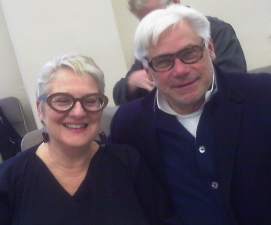 Lis Kalogris is a writer/producer/collaborator who has a passion for the Arts and for her family. She is a collector of visual art and craft who has done media and multi-arts project development and production. Her company, Flying Bulldog Productions LLC, has produced theatrical works in the Philadelphia area, San Diego and off-Broadway . Lis’ current musical theatre project, IN MY BODY, will premiere in Philadelphia in the Fall of 2016. Lis, and her husband, Mike, are thrilled to be Honorary Producers for LOBBY HERO at Theatre Horizon.
Lis Kalogris is a writer/producer/collaborator who has a passion for the Arts and for her family. She is a collector of visual art and craft who has done media and multi-arts project development and production. Her company, Flying Bulldog Productions LLC, has produced theatrical works in the Philadelphia area, San Diego and off-Broadway . Lis’ current musical theatre project, IN MY BODY, will premiere in Philadelphia in the Fall of 2016. Lis, and her husband, Mike, are thrilled to be Honorary Producers for LOBBY HERO at Theatre Horizon.
It’s A Privilege & A Joy
Monday afternoon, we at Theatre Horizon huddled around our smartphones to await the Barrymore nomination announcements from the Theatre Philadelphia press conference…
…we are so pleased and honored to have received the nomination for the following categories:
- Outstanding Overall Production of a Play: In the Blood
- Outstanding Overall Production of a Musical: Into the Woods
- Outstanding Direction of a Play: Pirronne Yousefzadeh, In the Blood
- Outstanding Direction of a Musical: Matthew Decker, Into the Woods
- Outstanding Leading Actor in a Musical: Steve Pacek, Into the Woods
- Outstanding Leading Actress in a Musical: Rachel Camp, Into the Woods
- Outstanding Supporting Actor in a Play: Akeem Davis, In the Blood
- Outstanding Supporting Actor in a Musical: Alex Bechtel, Into the Woods
- Outstanding Supporting Actor in a Musical: Charlie DelMarcelle, Into the Woods
- Outstanding Supporting Actor in a Musical: Michael Doherty, Into the Woods
- Outstanding Supporting Actress in a Musical: Liz Filios, Into the Woods
- Outstanding Supporting Actress in a Musical: Leigha Kato, Into the Woods
- Outstanding Scenic Design: Brian Dudkiewicz, In the Blood
- Outstanding Costume Design: Lauren Perigard, Into the Woods
- Outstanding Lighting Design: Cecilia Durbin, In the Blood
- Outstanding Music Direction: Amanda Morton, Into the Woods
- Outstanding Ensemble in a Play: In the Blood
- Outstanding Ensemble in a Musical: Into the Woods
- Virginia Brown Martin Philadelphia Award: In the Blood
We thank the Philadelphia and Montgomery County communities and beyond for believing in us so fully! Congrats to all of our beautifully talented actors, production persons and everyone else behind the scenes who represent Theatre Horizon in a magnificent way. You’ve made us so proud!
Read our Artistic Director, Erin Reily’s thoughts on PhillyMag.
The Barrymore Awards 2014
Director’s Note of THE SYRINGA TREE
By Steve Pacek, Director
Did you know the syringa tree is not indigenous to South Africa? Yet, it has adapted well and thrives there. In fact, in some regions within the country, syringa trees have become so abundant, they even classified as weeds–competing with native species for precious resources and producing poisonous berries…
Quite a fitting symbol Pam Gien used for her coming-of-age tale amidst the injustice of Apartheid.
I won’t pretend to be an authority on the subject of Apartheid or the government that created it. Politics, in general, confuse me. Growing up, I didn’t even know there was a difference between Africans and Afrikaans (I genuinely thought it always involved a misspelling). But I was taught the importance of celebrating, as human beings, what brings us together rather than what drives us apart. And that, I think, is the purpose of Pam’s story.
The world has always known injustice. It’s up to us to determine if it always will. The more we’re able to find things within each other that we recognize, the more we’ll find the power to unite. It requires us to look deeper than what appears to be on the surface. We have to search for what lies within. It’s inside there–in the beating of our hearts and the songs of our spirits and in our ability for compassion where we are one in the same…
…and no one should ever need a pass to go in there.
How’d We Do?
 I AM MY OWN WIFE  CIRCLE MIRROR TRANSFORMATION  Hitchcock’s THE 39 STEPS |
–Chris Nygen, owner of Bahn Mi Bar & Bistro
 Through our After School Drama Clubs, Summer Drama Camps, acting classes and workshops and our Autism Drama Program, we taught drama education to 732 students. If you missed our Autism Playwriting class’ feature on WHYY, check it out here.
Through our After School Drama Clubs, Summer Drama Camps, acting classes and workshops and our Autism Drama Program, we taught drama education to 732 students. If you missed our Autism Playwriting class’ feature on WHYY, check it out here.  Thanks to PNC Arts Alive, we provided free tickets to over 100 Norristown residents and free tuition for our acting classes to dozens of Norristown children.
Thanks to PNC Arts Alive, we provided free tickets to over 100 Norristown residents and free tuition for our acting classes to dozens of Norristown children.

Pay it Forward
|
Dear Friends of Theatre Horizon, Pay it Forward
This summer, I’m thinking a lot about what we pass on to others.
That’s because next season — our 10th anniversary — is a journey through the stories of mothers and fathers, sons and daughters. It’s three plays about the lessons we leave our children.
It’s also because this summer, Theatre Horizon is mentoring a brand new theatre company, New Cavern Productions, founded this year by talented University of the Arts theatre students and an enterprising young theatre producer named Steven Burke.
In response to my challenge to Steven to fill the theater during summer months when Theatre Horizon is dark, this 19-year-old and his equally skilled NCP co-founder, Evan Rieger, created a company overnight! They spent the last six months fundraising and casting, then produced and directed The Who’s Tommy, rockin’ and rollin’ at Theatre Horizon through Sunday. (Get tickets here!)
My challenge to Steven echoed the challenge put to Matthew Decker and me ten years ago by State Senator Daylin Leach in King of Prussia. Daylin told us the state could give us a $10,000 grant if we would produce a musical in the park. So we did Grease on $10,000. (That’s right! Theatre Horizon was 100% funded by the government that first summer. We are now .005% funded by the government, just one more reason why individual donors really ARE the lifeblood of Theatre Horizon, and the main reason art survives in America.)
The Importance of Supporting Emerging Artists
With a pay-it-forward mentality, I transferred the opportunity to create, explore, and discover at a critical moment in the lives of emerging Philadelphia artists. These young artists are on the road to breaking through, with new solutions to old problems.
For ten years, Theatre Horizon has been an incubator for emerging artists. These artists, in turn, have become the most sought-after actors in Philadelphia — Rachel Camp, Alex Keiper, and Michael Doherty, to name a few of the many talented, inventive, and highly entertaining actors who’ve lit up our stage.
These are the people moving theatre in our region forward. Do you want artists in your community? Well, here they are! At Theatre Horizon!
Dare to Fail
Young artists are especially brave, because the creative act is a tango with failure. Every time I produce a play, I leave in my wake piles of discarded ideas and failed dreams: the many seeds that must be scattered in order for one to finally flower.
Let’s all agree to just accept a certain amount of failure in our lives. Failure’s okay. It’s the only way to learn. Thanks to audiences like you, who continue to give Theatre Horizon room to fail, I believe we succeed more often than not in bringing you great shows about life’s big questions.
When Senator Leach called, Matt and I took the dare. Steve Burke and everyone creating Tommy are taking the dare right now.
I hope you’ll dare with us, too. Next season has some knockout shows, like an epic journey through South Africa in The Syringa Tree, an ambitious re-conceptualization by Matthew Decker of Into the Woods, and a searing drama about family life on the streets through In the Blood.
Join us! Subscribe!
Thank you!
Erin Reilly
Artistic Director
|
|
Theatre Horizon Supports Emerging Artists’ “Tommy”
Diverse Voices Reading Series Tackles the Topic of Race
Race is ridiculously difficult to talk about—certainly up there with politics and religion (if not beyond). It’s impossible to be completely objective, easy to offend, and simple to fall into defensive stances. That is all to say, it’s excellent subject matter for theater—messy, complicated and hard.
This year, Theatre Horizon launched its Diverse Voices Reading Series. The goal is to hear celebrated plays that spark dialogue about race. These plays are being considered for inclusion in future seasons. The next play in this series reminds me of just the very conversation about race we hope to inspire: it unravels, it builds upon itself, it asks questions, it’s seemingly reserved and then BAM—you find yourself in a the middle of a heated debate.
Bee-Luther-Hatchee by Thomas Gibbons is about a young editor who sets out to meet a reclusive author. Her investigation leads to unexpected confrontation, played out on the edge of the racial divide. I’d love to tell you more… but that would rob us of some excellent fodder for conversation next month. Let’s just say, if on December 9, you don’t leave the theater talking about this play, and hopefully the issues it brings to light, then I’ve failed to do my job as director. Which reminds me of the actual topic for this post…
What exactly is a director’s job during a reading?
Beats me. I mean, I assume it’s no different than a director’s job during a full-length production… not that I’m any more confident in that job description. But, what I can tell you is that readings are tough little nuts to crack. Here are a couple of the many reasons:
- Firstly, there’s never enough time. To prepare for the reading, to do proper dramaturgical research, to rehearse… we do hope to steal four hours of rehearsal for Bee-Luther-Hatchee… a luxury for most readings.
- Many of the normal tricks of the trade (things that can help clarify story, i.e. props, lighting cues, costumes, sound cues) are stripped away from you… mostly because of #1 and also a little because of #3.
- There’s not much money. Readings are a way for authors, actors, directors and producers to get together to see what’s next for a play. Do we want to produce this play? Does it need a workshop? How about we bring it to Broadway? Most outcomes require the producers to pony up some amount of cash… needless to say, one tries to put as little money into these things as necessary. (Thanks to Pennsylvania Humanities Council, Theatre Horizon is able to pay all those involved with bringing our readings to life, not to mention that we are able to offer the reading free-of-charge to you—our audience.)
- What stage directions get read? Who reads them? Do they help tell the story or do they distract from the story?
- Did I mention that there’s never enough time? You probably won’t even get a full reading of the play completed before it’s actually time for the audience to arrive. This means that the director and the actors don’t get to hear the whole thing out loud, in order, until there’s an audience. So… that’s stressful… but it’s also magical.
So there you have it… a difficult topic—race—in the context of a difficult form of theater—the reading. It’s going to be a night of theater (and dialogue) you don’t want to miss. Availability is limited so reserve your tickets now by clicking here.
